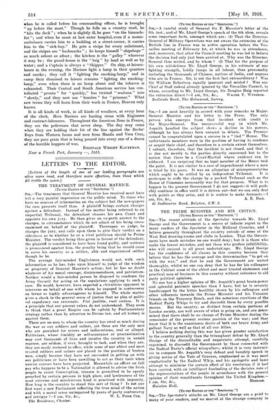LETTERS TO THE EDITOR.
getters of the length of one of our leading paragraphs arc often more read, and therefore more effective, than those which fill treble the space.] THE TREATMENT OF GENERAL MAITRICE. [To THE EDITOR OF THE " SPECTATOR."] SIR,—The treatment that General Maurice has received must have left a very painful impression on the public mind. To those who have no sources of information on the subject but the newspapers the case presents itself thus. A plaintiff brings certain charges against a defendant. Instead of the matter being referred to an impartial Tribunal, the defendant chooses his own Court and appoints his own jury. He then gives an ex-parte answer to the charges, in circumstances which do not admit of his being cross- examined on behalf of the plaintiff. Thereupon as judge, he charges the jury, and calls upon them to give their verdict on a side-issue as to whether he or a rival politician should be Prime Minister. The verdict being thus given in favour of the defendant, the plaintiff is considered to have been found guilty, and sentence is pronounced against him, the penalty being that he should cease to serve his country as a soldier, able and experienced soldier though he be.
The average fair-minded Englishman would not, with such information as he has, take upon himself to judge of the wisdom or propriety of General Maurice's action; but he has no doubt whatever of his moral courage, disinterestedness, and patriotism. Neither would a fair-minded person be disposed to condemn the Army Council for acting on the regulations applying to such a ease. He would, however, have expected a chivalrous opponent to intervene on behalf of one with whom he engaged in controversy on terms so highly advantageous to himself. The whole matter gives a shock to the general sense of justice that no plea of politi- cal expediency can extenuate. Fiat justitia, ruat coelum. It is a principle that our present rulers do not understand. They seem to think that a great Empire can be upheld by Parliamentary strategy rather than by attention to Divine law, and all history is against them.
There are no men to whom the country has owed so much during the war as our soldiers and sailors, yet these are the only men who are punished for errors and indiscretions, real or alleged. Politicians, whose timidity or self-assurance or procrastination may cost thousands of lives and involve the country in untold expense, are seldom, if ever, brought to task, and when they are, they are easily restored to office, while some of our ablest and most trusted soldiers and sailors are placed in the position of broken men, simply because they have not succeeded in getting on with our politicians or have been unwilling to act as their tools when unwise courses have been projected. Meanwhile an officer on full pay who happens to be a Nationalist is allowed to advise the Irish people to resist Conscription, treason is permitted to be openly preached by certain persons in high place, and lawlessness of the most extreme and mischievous kind is practised with impunity. How long is the country to stand this sort of thing P Is not our first want a new Parliament reflecting the true mind of the nation and with a moral sense unimpaired by years of party controversy


























 Previous page
Previous page